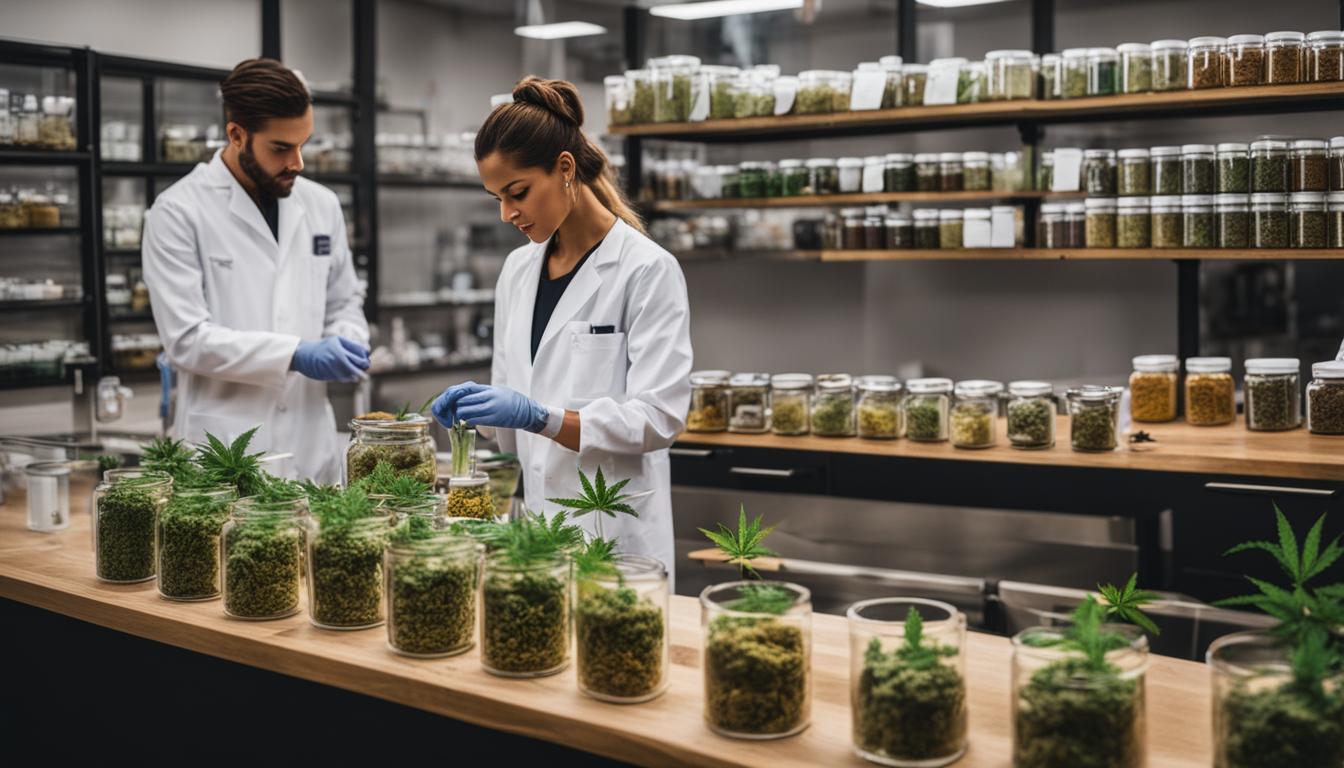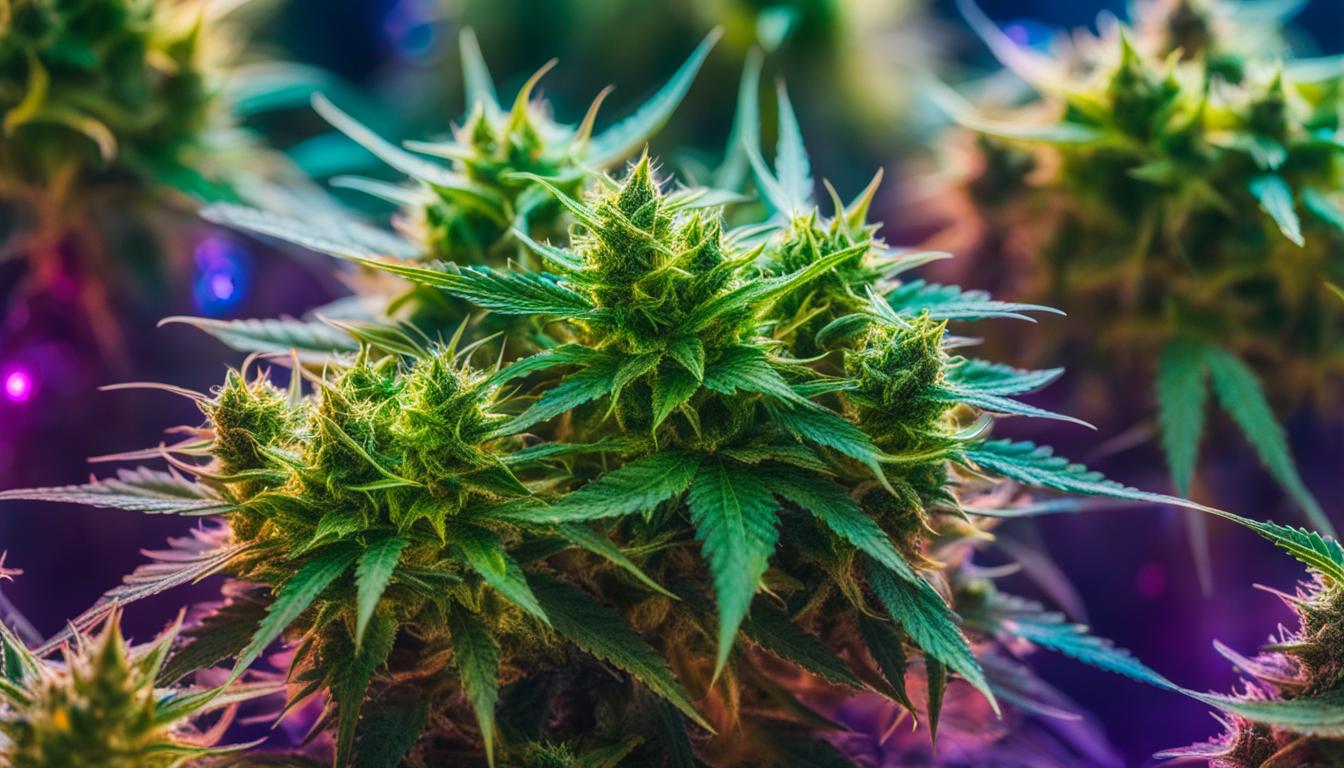Uncategorized
Naturally Farmed Cannabis: Benefits and Quality
Hello, my name is Jane and I want to discuss the benefits and quality of naturally farmed cannabis. As the legalization of cannabis continues to expand, more people are turning to this versatile plant for various reasons. Whether it’s for recreational use or as a potential therapeutic substance, the quality and cultivation methods of cannabis play a significant role in the overall experience. In this article, I will highlight the advantages of organic cultivation and sustainable farming practices, shedding light on why naturally farmed cannabis stands out in terms of flavor, environmental impact, and health and safety.
Organic certification is paramount when it comes to cannabis production. It ensures that the products are grown using sustainable and environmentally friendly methods. With certified organic cannabis, you can rest assured that it is free from synthetic pesticides and other unnatural forms of pest control. This type of cultivation promotes soil health and biodiversity, resulting in a better quality product. By choosing naturally farmed cannabis, consumers can enjoy the benefits of superior flavor, less environmental impact, and reduced risk of contamination with toxins and heavy metals.
Key Takeaways:
- Naturally farmed cannabis is grown using sustainable and environmentally friendly methods.
- Certified organic cannabis is free from synthetic pesticides and other unnatural forms of pest control.
- Organic cultivation promotes soil health and biodiversity.
- Choosing naturally farmed cannabis ensures superior flavor and less environmental impact.
- Naturally farmed cannabis has a reduced risk of contamination with toxins and heavy metals.
Understanding Organic Certification for Cannabis
When it comes to cannabis, organic certification plays a vital role in ensuring the quality and integrity of products. By obtaining organic certification, companies commit to adhering to strict standards set by certifying organizations, such as the US Department of Agriculture (USDA).
Organic certification guarantees that cannabis is grown using sustainable and environmentally friendly methods.
What does it mean for cannabis to be certified organic? Let’s take a closer look at the requirements:
- Use of at least 95% organic ingredients: Certified organic cannabis products are made primarily from organic materials, minimizing the use of synthetic chemicals.
- Avoidance of prohibited substances: To meet organic standards, cannabis cultivation must steer clear of synthetic pesticides, fertilizers, genetically modified organisms (GMOs), and other prohibited substances.
- Packaging requirements: Organic cannabis products must be packaged in materials that comply with organic certification standards, ensuring that the integrity of the product is maintained throughout its lifecycle.
To illustrate this, let’s take a look at a real-life example:
BlueSky Organics: A Commitment to Organic Certification
BlueSky Organics, a reputable cannabis company, prioritizes organic certification to provide consumers with the assurance that their products meet the highest standards of organic cultivation. They have partnered with Pro-Cert, a respected third-party organic certification agency.
| Certification Agency | Country |
|---|---|
| Pro-Cert | Canada and the United States |
“By obtaining organic certification through Pro-Cert, BlueSky Organics ensures that their cannabis products comply with organic standards in both Canada and the US,” says John Smith, the CEO of BlueSky Organics.
With their commitment to organic certification, BlueSky Organics demonstrates their dedication to providing customers with high-quality, sustainably cultivated cannabis.
By choosing cannabis products with the certified organic label, consumers can have confidence in the organic cultivation methods utilized and enjoy the benefits of a more environmentally friendly and health-conscious choice.
Benefits of Organic Cannabis Growing
Organic cannabis growing offers numerous benefits, contributing to a superior flavor profile and reduced environmental impact. The holistic and organic approach implemented in organic cultivation practices promotes the production of flavorful and visually appealing buds. By prioritizing soil health and utilizing natural pest control methods, organic growers create a more sustainable and environmentally conscious cultivation process.
Superior Flavor
The flavor of organic cannabis is renowned for its exceptional quality. Organic cultivation techniques focus on nurturing the plant through natural methods, resulting in flavorful and aromatic buds. The absence of synthetic fertilizers and pesticides allows the plant to develop its natural flavors without interference, producing a more authentic and enjoyable cannabis experience.
Environmental Implications
Compared to conventional growing methods, organic cannabis growing has a significantly lower environmental impact. Conventional cultivation practices often involve the use of synthetic fertilizers and pesticides that can harm soil integrity, destroy habitats, and deplete valuable natural resources. In contrast, organic growers prioritize soil health, promoting the growth of beneficial microorganisms and maintaining biodiversity. With minimal reliance on synthetic inputs, organic cultivation helps protect ecosystems and contribute to overall sustainability.
Additionally, the use of natural pest control methods reduces the risk of harmful chemicals entering the environment. Organic growers employ techniques such as beneficial insects, companion planting, and crop rotation to manage pests naturally. This approach minimizes the negative impact on beneficial insects, pollinators, and other organisms that contribute to a healthy ecosystem.
Comparing Organic and Conventional Cannabis Growing
| Aspect | Organic Growing | Conventional Growing |
|---|---|---|
| Use of Synthetic Inputs | Minimal or none | Extensive use of synthetic fertilizers and pesticides |
| Soil Health | Emphasizes soil health and biodiversity | Risk of soil degradation due to chemical use |
| Environmental Impact | Lower impact; promotes sustainability | Potential damage to ecosystems and natural resources |
| Flavor | Superior flavor due to natural cultivation methods | Flavor may be affected by synthetic inputs |
By choosing organic cannabis, consumers not only enjoy the superior flavor of the product but also support environmentally friendly practices that prioritize the long-term health of our planet. The organic cannabis industry plays a crucial role in advancing sustainable agriculture and promoting a more conscious approach to cultivation.

Health and Safety Benefits of Organic Cannabis
When it comes to cannabis consumption, health and safety should always be a top priority. That’s where organic cannabis cultivation comes in, offering a range of benefits that prioritize your well-being. Two key factors that contribute to these benefits are the development of healthy, contaminant-free soil and the use of organic pest control methods.
Organic cannabis cultivation focuses on creating soil that is free from contaminants such as heavy metals or radioactive substances. This ensures that the cannabis you consume is of the highest quality and doesn’t pose any health risks. By choosing organic cannabis, you can enjoy the peace of mind knowing that you are getting a product that is free from harmful toxins.
Another important aspect of organic cultivation is the use of organic pest control methods. Unlike conventional methods that rely on harsh and dangerous chemicals, organic pest control utilizes natural alternatives that are safer for both consumers and the environment. By avoiding the use of synthetic pesticides, organic cannabis minimizes the potential risks associated with pesticide residues and promotes a healthier end product.
Overall, the health and safety benefits of organic cannabis are undeniable. By selecting naturally farmed cannabis, you can feel confident that you are consuming a product that not only offers superior flavor and reduced environmental impact but also prioritizes your well-being.
Cannabis as a Therapeutic Substance
I have always been fascinated by the potential therapeutic effects of medical cannabis. With compounds like tetrahydrocannabinol (THC) and cannabidiol (CBD) gaining attention, researchers are uncovering exciting possibilities for cannabis as a treatment option.
One area where medical cannabis has shown promise is in managing the side effects of chemotherapy. Nausea and vomiting can be incredibly debilitating for cancer patients undergoing treatment, but research suggests that cannabis can help alleviate these symptoms. In fact, synthetic THC has been approved by the FDA for this purpose, providing relief for many individuals.
Patients with multiple sclerosis often experience spasticity, which can lead to muscle stiffness and pain. Studies have found that cannabis containing both THC and CBD can help manage spasticity in these individuals, improving their mobility and quality of life.
Cannabis has also shown potential as a natural way to alleviate chronic pain. For those suffering from conditions like arthritis or neuropathy, medical cannabis with the right balance of cannabinoids can provide much-needed relief without the side effects of traditional pain medications.
The effects of cannabis on sleep quality have also been studied, with encouraging findings for conditions like sleep apnea. Medical cannabis has the potential to improve sleep patterns and promote a more restful night’s sleep, enhancing overall well-being.
Research is ongoing, and we are just beginning to scratch the surface of the therapeutic potential of cannabis. With its diverse array of cannabinoids, this plant holds countless possibilities for addressing a wide range of conditions and symptoms.
Safety Considerations for Cannabis Use
When it comes to using cannabis, it’s important to be aware of the potential side effects and risks involved. While cannabis can provide therapeutic benefits, it’s crucial to understand the safety considerations to ensure responsible use. I want to emphasize that cannabis affects individuals differently, and it’s important to assess your own tolerance and preferences.
One of the key factors to consider is the psychoactive compound in cannabis called THC. Consuming excessive amounts of THC can lead to adverse effects such as anxiety, paranoia, and impaired cognitive function. It’s essential to start with low doses and gradually increase if needed. Remember, less is often more when it comes to cannabis.
Smoking cannabis poses additional risks, especially for individuals with pulmonary diseases or those who mix cannabis with tobacco. Inhalation of smoke can irritate the lungs and may cause respiratory issues. If you’re concerned about the potential harm caused by smoking, consider alternative methods such as vaporization or consumption of edibles, tinctures, or oils.
“Smoking cannabis poses additional risks, especially for individuals with pulmonary diseases or those who mix cannabis with tobacco.”
Vulnerable populations, including adolescents and pregnant individuals, should approach cannabis use with caution. Limited research exists on the long-term effects of cannabis in these groups, and it’s important to prioritize their well-being. Adolescents should be particularly cautious due to the potential impact on brain development.
Cannabis can also interact with certain medications, which highlights the importance of consulting with healthcare professionals if you’re using prescription drugs. They can provide guidance on potential drug interactions and help ensure your safety.
To summarize, responsible cannabis use involves carefully considering the potential side effects and risks. Start with low THC doses, be aware of smoking risks, and exercise caution if you’re part of a vulnerable population. Always consult with healthcare professionals, especially when using cannabis alongside other medications.
Quality Control and Product Safety
Ensuring the quality and safety of cannabis products is crucial. Purchasing cannabis from regulated state dispensaries provides a higher level of quality control, as these products undergo testing and labeling requirements.

One such reputable source is Verano, a national cannabis provider that exemplifies the importance of transparency and quality. Verano upholds rigorous standards in their cultivation process to ensure the production of safe and high-quality cannabis products.
The Importance of Regulated State Dispensaries
Regulated state dispensaries play a vital role in providing consumers with access to safe and reliable cannabis products. These dispensaries operate under state regulations that require comprehensive testing and quality control measures. By purchasing from regulated dispensaries, consumers can have confidence in the safety and quality of the products they are purchasing.
“Regulated state dispensaries prioritize consumer safety and product quality through rigorous testing and compliance with state regulations.”
Verano: A Commitment to Quality
Verano is a renowned cannabis provider that is committed to delivering safe and exceptional products to consumers. They have established a reputation for their dedication to quality through their stringent cultivation practices and comprehensive testing protocols.
Verano takes several important steps to ensure the safety and quality of their cannabis products:
- Cloning cannabis plants: Verano uses cloning techniques to maintain genetic consistency and produce consistent, reliable products.
- Chemical testing: Verano conducts thorough chemical testing to analyze the cannabinoid composition, ensuring accurate potency and consistency.
- Heavy metal testing: They also conduct testing for heavy metals to ensure their products are free from harmful contaminants.
- Pesticide testing: Verano tests their products for pesticides, ensuring that they meet stringent safety standards.
- Mold testing: They conduct regular mold testing to ensure their products are free from any potential health hazards.
By employing these stringent quality control measures, Verano demonstrates their commitment to providing safe and reliable cannabis products to consumers.
Empowering Consumers with Information
Understanding the composition and potential risks associated with cannabis products is essential for consumers to make informed decisions about their health and well-being. Reputable providers like Verano prioritize transparency and educate consumers about the composition and quality of their products.
Through clear labeling and detailed product information, Verano empowers consumers to choose products that align with their preferences and needs. By providing comprehensive information about the cannabinoid profile, terpene content, and cultivation practices, Verano ensures that consumers can make informed choices based on their desired experiences and expectations.
By choosing regulated state dispensaries and providers like Verano, consumers can have peace of mind knowing that they are purchasing safe and high-quality cannabis products.
The Rich Chemical Profile of Cannabis
Cannabis is a remarkable plant that contains a diverse range of chemical compounds, including over 100 cannabinoids and various terpenes. These compounds contribute to the unique characteristics and potential therapeutic effects of cannabis. Let’s explore the chemical profile of this fascinating plant.
The Two Key Cannabinoids: THC and CBD
The two most well-known cannabinoids found in cannabis are tetrahydrocannabinol (THC) and cannabidiol (CBD). THC is the primary psychoactive compound that produces the euphoric high commonly associated with cannabis use. CBD, on the other hand, does not induce psychoactive effects but has gained attention for its potential therapeutic properties.
Did you know? THC and CBD interact with the endocannabinoid system, a complex network of receptors in the human body that regulates various physiological processes, including pain sensation, appetite, and stress response.
The Flavorful World of Terpenes
In addition to cannabinoids, cannabis also contains a wide array of terpenes. Terpenes are aromatic compounds responsible for the distinct flavors and aromas found in different cannabis strains. Each strain can have a unique combination of terpenes, contributing to its specific scent profile.
Terpenes not only enhance the sensory experience of consuming cannabis but may also offer potential therapeutic benefits. Some terpenes, such as myrcene, limonene, and linalool, have been studied for their anti-inflammatory, analgesic, and sedative properties.
Unlocking the Potential of Cannabis Chemistry
The rich chemical profile of cannabis extends beyond THC, CBD, and terpenes. The plant contains numerous other cannabinoids, such as cannabigerol (CBG), cannabinol (CBN), and cannabichromene (CBC), each with its own potential effects and benefits.
Fun fact: Researchers are continually exploring the potential synergistic effects of combining different cannabinoids and terpenes, known as the entourage effect. This concept suggests that the combined presence of various compounds in cannabis may enhance or modify their individual effects.
To fully understand the chemical complexity and potential therapeutic applications of cannabis, ongoing research is essential. With each new discovery, we gain a deeper appreciation for the remarkable world of cannabis chemistry and its potential to improve our wellbeing.

| Cannabinoid | Properties |
|---|---|
| THC | Potent psychoactive properties |
| CBD | Potential therapeutic applications |
| CBG | Antibacterial, anti-inflammatory properties |
| CBN | Appears to have sedating effects |
| CBC | Potential anti-inflammatory properties |
The Role of Phytochemicals in Cannabis
Phytochemicals, including polyphenols and antioxidants, play an essential role in cannabis. These natural compounds offer potential health benefits and are currently under extensive research. Polyphenols specifically have been associated with antioxidant and anti-inflammatory effects, which contribute to the overall wellness properties of cannabis.
The rich presence of phytochemicals in cannabis showcases its potential as a valuable source of natural compounds for therapeutic and medicinal applications. Ongoing research aims to explore the specific phytochemicals present in cannabis and their potential therapeutic benefits in greater detail.

Antioxidants and Health Benefits
Antioxidants are known for their ability to neutralize harmful free radicals and protect against oxidative stress. Cannabis contains various antioxidants, which may contribute to its potential health benefits.
One study published in the Journal of Clinical Biochemistry and Nutrition found that cannabis extracts containing polyphenols exhibited significant antioxidant activity. This suggests that the presence of these compounds in cannabis could potentially contribute to the overall antioxidant capacity of the plant.
“Polyphenols in cannabis have been associated with antioxidant and anti-inflammatory effects, which are vital for maintaining optimal health.”
Antioxidants play a crucial role in supporting the body’s natural defense systems. By consuming cannabis rich in phytochemicals, individuals may benefit from the potential antioxidant effects, promoting overall health and well-being.
Potential Therapeutic Applications
The evolving research on phytochemicals in cannabis presents exciting potential for therapeutic applications. However, it is important to note that further studies are needed to fully understand the specific effects of individual phytochemicals and their potential synergies within the complex cannabis chemical profile.
While the primary focus has been on cannabinoids like THC and CBD, the growing interest in the role of phytochemicals highlights the need for a comprehensive understanding of the chemical composition of cannabis and its potential therapeutic benefits.
Exploring and harnessing the unique properties of these phytochemicals may lead to the development of targeted therapeutic interventions and formulations. This ongoing research opens doors to new possibilities for utilizing cannabis as a source of natural compounds for various health conditions.
The Future of Cannabis Research
The study of phytochemicals in cannabis is a dynamic field, continually expanding our understanding of the plant’s potential health benefits. As scientific advancements pave the way for more extensive research, the role of phytochemicals continues to captivate researchers, healthcare professionals, and consumers alike.
By further exploring the benefits and applications of phytochemical-rich cannabis, we can unlock a wealth of possibilities for natural, plant-based therapies and wellness. Continued collaboration between scientists, cultivators, and healthcare professionals will be instrumental in harnessing the full potential of these phytochemicals and their contribution to human health and well-being.
Cannabis Cultivars and Genetic Variability
Cannabis is a remarkable plant that exhibits genetic variability, resulting in an array of cultivars with distinct chemical profiles. This genetic diversity is a testament to its adaptability and versatility. Each cannabis cultivar has its own unique combination of cannabinoids, terpenes, and other phytochemicals, offering a plethora of possibilities for therapeutic applications.
One fascinating aspect of cannabis cultivation is the focus on chemovars, which are defined by their specific chemical composition. Chemovars allow researchers and cultivators to identify and develop cannabis strains that have targeted therapeutic effects. By understanding the genetic variability and characteristics of different cannabis cultivars, we can tailor our cultivation practices to enhance specific chemovars and their desired attributes.
“The genetic diversity of cannabis cultivars allows us to explore the various chemical profiles and their potential therapeutic benefits.”
Research on cannabis genetics has opened up new opportunities for the development of chemovars with targeted therapeutic purposes. By analyzing a cultivar’s genetic makeup and chemical composition, researchers can better understand its potential effects on the human body and identify specific chemovars that may be effective in treating various medical conditions. This knowledge has the potential to revolutionize the medical cannabis industry and provide patients with more personalized treatment options.
The cultivation of cannabis is an evolving field, and advances in genetic research are contributing to the overall understanding of this versatile plant. Genetic studies enable us to unlock the potential of cannabis by identifying and preserving unique genetic traits that produce desirable chemical profiles. This knowledge not only benefits medical cannabis, but it also allows cultivators to develop cultivars with specific flavors, aromas, and effects for recreational use.
Overall, the genetic diversity of cannabis cultivars holds immense potential for both medical and recreational purposes. By harnessing this diversity, we can continue to explore the therapeutic applications of cannabis and develop chemovars that meet the specific needs of patients and consumers.
Now that we have explored the genetic variability of cannabis cultivars, let’s delve into the importance of organic certification in ensuring the quality and safety of cannabis products.
Conclusion
Naturally farmed cannabis offers a range of benefits, from its superior flavor to its reduced environmental impact and enhanced health and safety. With organic certification, consumers can trust that the cannabis they consume is grown using sustainable and environmentally friendly practices. While the therapeutic potential of cannabis, particularly compounds like THC and CBD, is still being explored, it is essential to consider safety factors and consult with healthcare professionals.
By prioritizing quality control and understanding the chemical profile of cannabis, consumers can make informed choices and enjoy the numerous benefits of naturally farmed cannabis. Whether using cannabis for medical purposes or simply for recreational enjoyment, organic cannabis ensures a high level of quality and purity. From its cultivation to its consumption, naturally farmed cannabis provides a natural and holistic approach that aligns with a sustainable and healthy lifestyle.
Experience the rich flavors and therapeutic effects of naturally farmed cannabis while minimizing your environmental impact. Choose quality, choose naturally farmed cannabis for a truly elevated and enjoyable cannabis experience.
FAQ
What are the benefits of naturally farmed cannabis?
Naturally farmed cannabis offers superior flavor, reduced environmental impact, and enhanced health and safety benefits.
What does organic certification mean for cannabis?
Organic certification ensures that cannabis products are grown using sustainable and environmentally friendly methods, without the use of synthetic pesticides or unnatural pest control methods.
What are the benefits of organic cannabis growing?
Organic cannabis growing promotes better flavor, less environmental impact, and a more sustainable and environmentally conscious cultivation process compared to conventional methods.
What are the health and safety benefits of organic cannabis?
Organic cannabis cultivation prioritizes soil health and reduces the risk of consuming cannabis contaminated with toxins or heavy metals. It also utilizes natural pest control methods, resulting in a safer and healthier product.
What is the therapeutic potential of cannabis?
Compounds like THC and CBD in cannabis have shown promise in managing chemotherapy side effects, pain, and sleep disturbances. However, further research is needed to fully understand its therapeutic effects.
Are there any safety considerations for cannabis use?
Excessive THC consumption and smoking cannabis pose risks, particularly for individuals with pulmonary diseases or those who mix cannabis with tobacco. Vulnerable populations, like adolescents and pregnant individuals, should approach cannabis use with caution. It is important to consult with healthcare professionals.
How can I ensure the quality and safety of cannabis products?
Purchasing cannabis from regulated state dispensaries ensures a higher level of quality control, as these products undergo testing and labeling requirements to guarantee their safety and composition.
What is the chemical profile of cannabis?
Cannabis contains over 100 cannabinoids, including THC and CBD, as well as various terpenes. These compounds interact with the endocannabinoid system in the human body and contribute to the flavor and aroma of cannabis.
What role do phytochemicals play in cannabis?
Phytochemicals, including polyphenols and antioxidants, are present in cannabis and have been associated with antioxidant and anti-inflammatory effects. They may contribute to the overall wellness properties of cannabis.
What is the significance of cannabis cultivars and genetic variability?
Cannabis exhibits genetic variability, resulting in different cultivars with distinct chemical profiles. Understanding this variability and genetics can lead to the development of specific chemovars for targeted therapeutic purposes.

